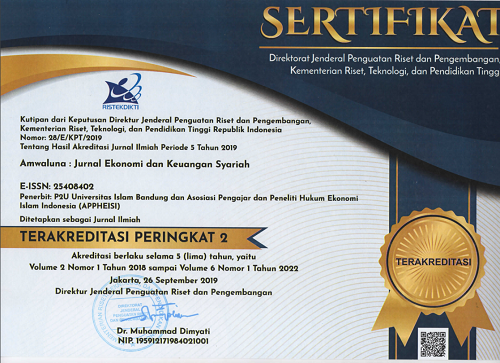The Analysis Of Influential Factors Of Halal Supply Chain Management Implementation In Banda Aceh's Hotels
Abstract
Aceh is a province in Indonesia that implements Islamic law in its territory and is regulated by Qanun decree. Aceh Qanun No. 8/2016 confirms the determination of the halal product guarantee system. However, the Qanun lacks presenting, regulating, and providing Halal Supply Chain Management (HSCM). The data used in this research was obtained and observed from several Hotels in Banda Aceh that have implemented Halal Certification accreditation. This Research aims to implement multiple linear regression as an approach to review the implementation of HSCM at hotel food service by looking at the interrelationship of the contributing factor in HSCM. There are seven relationships between variables that form hypotheses, namely halal management, quality and hygiene of halal food, halal warehousing, halal transportation, halal raw materials, halal production facilities, and halal suppliers. ANOVA testing (F-test) shows that all factors influence HSCM. However, Partial testing (T-test) shows that the most influential factors on HSCM are given by halal management and halal warehousing.
Keywords
Full Text:
PDFReferences
Ali, M. H., Tan, K. H., & Pawar, K. (2015). Extenuating Food Integrity Risk through Supply Chain Integration : The Case of Halal Food. (December). https://doi.org/10.7232/iems.2014.13.2.154
Almunawwaroh, M., & Marliana, R. (2018). Pengaruh Car,Npf Dan Fdr Terhadap Profitabilitas Bank Syariah Di Indonesia. Amwaluna: Jurnal Ekonomi Dan Keuangan Syariah, 2(1), 1–17. https://doi.org/10.29313/amwaluna.v2i1.3156
HAS 23000. (2012). Lembaga Pengkajian Pangan Obat-Obatan dan Kosmetika Majelis Ulama Indonesia.
Manning, L. (2018). Systems for Sustainability and Transparency of Food Supply Chains. In Sustainable Food Systems from Agriculture to Industry (pp. 153–187). https://doi.org/10.1016/b978-0-12-811935-8.00005-6
Marco Tieman. (2011). The application of Halal in supply chain management: In-depth interviews. Journal of Islamic Marketing, 2(2), 186–195. https://doi.org/10.1108/17590831111139893
Marucheck, A., Greis, N., Mena, C., & Cai, L. (2011). Product safety and security in the global supply chain: Issues, challenges and research opportunities. Journal of Operations Management, 29(7–8), 707–720. https://doi.org/10.1016/j.jom.2011.06.007
Mohd, H. A., & Norhidayah, S. (2018). Eleven shades of food integrity: A halal supply chain perspective. Trends in Food Science and Technology, 71(December 2017), 216–224. https://doi.org/10.1016/j.tifs.2017.11.016
Ngah, A. H., Zainuddin, Y., & Thurasamy, R. (2014). Adoption of Halal Supply Chain among Malaysian Halal Manufacturers: An Exploratory Study. Procedia - Social and Behavioral Sciences, 129, 388–395. https://doi.org/10.1016/j.sbspro.2014.03.692
Ngah, A. H., Zainuddin, Y., & Thurasamy, R. (2015). Barriers and enablers in adopting of Halal Warehousing. Journal of Islamic Marketing, 6(3), 354–376. https://doi.org/10.1108/mrr-09-2015-0216
Nor, M. R. M., Latif, K., Ismail, M. N., & Nor, M. N. M. (2017). Critical Success Factors of Halal Supply Chain Management from the Perspective of Malaysian Halal Food Manufacturers. Nigerian Chapter of Arabian Journal of Business and Management Review, 4(1), 1–23. https://doi.org/10.12816/0031515
Omar, E.N & Jaafar, H. . (2011). Halal transportation in the Food Industry - A Conceptual Model. In IEEE Symposium on Business, Engineering and Industrial Applications (ISBEIA).
Priyatmoko, R., Maulana, A., & Oktaviyanti, D. (2021). Sharia hotel attributes and their urgency for muslim tourists’ needs in. Amwaluna: Jurnal Ekonomi Dan Keuangan Syariah, 5(1), 76–89.
Ruth, V., Kok, E. J., van der Spiegel, M., van der Fels-Klerx, H. J., Sterrenburg, P., van Ruth, S. M., … Kok, E. J. (2012). Halal assurance in food supply chains: Verification of halal certificates using audits and laboratory analysis. Trends in Food Science and Technology, 27(2), 109–119. https://doi.org/10.1016/j.tifs.2012.04.005
Sarwar, A. (2013). Medical tourism in Malaysia: Prospect and challenges. Iranian Journal of Public Health, 42(8), 795–805.
Sawyer, S. F. (2009). Analysis of Variance: The Fundamental Concepts. Journal of Manual & Manipulative Therapy, 17(2), 27E-38E. https://doi.org/10.1179/jmt.2009.17.2.27e
Shrestha, N. (2020). Detecting Multicollinearity in Regression Analysis. American Journal of Applied Mathematics and Statistics, 8(2), 39–42. https://doi.org/10.12691/ajams-8-2-1
Sow, M. T. (2014). Using ANOVA to Examine the Relationship between Safety & Security and Human Development. Journal of International Business and Economics, 2(4), 101–106. https://doi.org/10.15640/jibe.v2n4a6
Syed Shah Alam, & Nazura Mohamed Sayuti. (2011). Applying the Theory of Planned Behavior (TPB) in halal food purchasing. International Journal of Commerce and Management, 21(1), 8–20. https://doi.org/10.1108/10569211111111676
Talib, Z., Zailani, S., & Zainuddin, Y. (2010). Conceptualizations on the Dimensions for Halal Orientation for Food Manufacturers: A Study in the Context of Malaysia. Pakistan Journal of Social Sciences, 7(2), 56–61. https://doi.org/10.3923/pjssci.2010.56.61
Tieman, M. et al. (2012). Principles in halal supply chain management. Principles in Halal Supply Chain Management. https://doi.org/http://dx.doi.org/10.1108/MRR-09-2015-0216
Tieman, M., & Ghazali, M. C. (2014). Halal Control Activities and Assurance Activities in Halal Food Logistics. Procedia - Social and Behavioral Sciences, 121(September 2012), 44–57. https://doi.org/10.1016/j.sbspro.2014.01.1107
Yusoff, F. A. M., Yusof, R. N. R., & Hussin, S. R. (2015). Halal food supply chain knowledge and purchase intention. International Journal of Economics and Management, 9(Special Issue), 155–172.
DOI: https://doi.org/10.29313/amwaluna.v6i1.7837
Refbacks
- There are currently no refbacks.
Editorial Office:
Syariah Faculty, Universitas Islam Bandung
Jalan Tamansari No. 24-26 Kota Bandung

Amwaluna : Jurnal Ekonomi dan Keuangan Syariah is licensed under a Creative Commons Attribution-NonCommercial-ShareAlike 4.0 International License.








